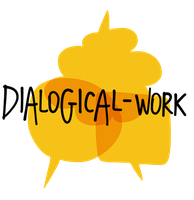Dialogical Work | EN

Why the dialogical approach?
Because it increases and enhances the skills necessary to strengthen and consolidate integrated and multi-professional working methods, oriented towards collaborative practices and overcoming the bureaucratic and sectorial approach in educational, health and social contexts.
Because it is functional to the evolutionary subsistence of complex organisational contexts that are continually challenged by changes.
Because it is strategic for spreading a change of perspective necessary to promote generative and permanent networks of collaboration involving citizenship, intermediate bodies, services and institutions at a peer level.
The dialogical approach "is not a method in the strict sense but a stance, an attitude, a way of being among people, at the centre of which lies a fundamental relationship of otherness: people are equal, but not in the same way" (Arnkil, T.; Seikkula, J.; 2013).
The Project
Dialogical Work (DW) is an international project funded by the European Union Erasmus+ Programme through the call KA220-VET - Cooperation partnerships in vocational education and training - Call 2021 - Round 1, lasting 30 months (28/02/2022 - 30/08/2024).
It is part of a wide-ranging programme aimed at developing cooperation across countries and to innovate organisational processes through more inclusive and high-quality vocational education and training (VET).
Specifically, Dialogical Work aims to promote integrated and multi-professional work between professionals from social, health and education organisations, through the practice and dissemination of innovative dialogical approaches oriented towards the active participation of stakeholders and actors from local and national work settings (bottom up).
To implement the dialogical approach in organisations and to make the changes systemic and sustainable over time, two specific types of actors are trained through the project:
- The governance team, i.e., the group of different professional figures with political and/or managerial responsibility within the inter-organisational stakeholder nodes;
- The dialogic approach tutor, who connects the different organisational levels, assisting the multi-professional teams in order to adapt the dialogic working practices to changing, increasingly mobile, multicultural and digital contexts.
Consortium composition
The Emilia-Romagna Region participates in the Dialogical Work project as project leader.
The project involves 10 partners from: Belgium, Finland, Italy, Lithuania, the Netherlands, Poland, Portugal and Romania.
Activities and outputs
The DW project establishes a network of stakeholder groups in the participating countries, called inter-organisational nodes, which have institutional responsibility for project management and training of professionals in the dialogical approach, as well as for organising, evaluating and delivering educational, social and health services.
Dialogical Work sets 5 outcomes to achieve in order to accompany participants in the pathway of awareness, learning, implementation and development of dialogical competences, essential for the work of multi-professional and integrated teams:
1) Guidelines for creating and supporting governance towards a dialogic approach ( 1.28 MB)
1.28 MB)
Responsible Entity: University of Naples Federico II (Italy)
Develop guidelines for the creation and support of a governance group which is necessary to implement the dialogic approach in organisations.
The governance group is responsible for defining the structure of the network that oversees the different levels of care and treatment, consolidating awareness of the choice of the dialogic approach.
OTHER LANGUAGES
Dutch, NL (237.87 KB) | Finnish, FI (
492.65 KB) | French, FR (
254.86 KB) | Lithuanian, LT (
167.55 KB) | Polish, PL (
306.8 KB) | Portoguese, PT (
363.43 KB) | Romanian, RO (
269.36 KB)
2) Skills profile for dialogue approach tutors ( 733.53 KB)
733.53 KB)
Responsible Entity: Stichting Hogeschool Rotterdam (The Netherlands)
Identify a competence profile for the dialogical approach tutor, who will become the bridging figure between the governance group and the multi-professional teams acting in the different care and assistance contexts indicated by the partners.
OTHER LANGUAGES
Dutch, NL (349.51 KB) | Finnish, FI (
221.51 KB) | French, FR (
259.64 KB) | Lithuanian, LT (
308.48 KB) | Polish, PL (
237.19 KB) | Portoguese, PT (
246.99 KB) | Romanian, RO (
225.15 KB)
3) Toolkit for the dialogic approach ( 1.1 MB)
1.1 MB)
Responsible Entity: Oy Dialogues & Design Ltd (Finland)
To identify and provide the crucial methodologies and tools to implement dialogic processes in different contexts.
The dialogic approach kit is an empowerment device for professionals.
OTHER LANGUAGES
Dutch, NL (292.06 KB) | Finnish, FI (
236.34 KB) | French, FR (
294.42 KB) | Lithuanian, LT (
286.71 KB) | Polish, PL (
216.76 KB) | Portoguese, PT (
311.08 KB) | Romanian, RO (
238.24 KB)
4) Dialogic approach tutor training curriculum ( 384.56 KB)
384.56 KB)
Responsible Entity: Oy Dialogues & Design Ltd (Finland)
Develop a template for dialogical approach tutors containing all the necessary information to organise the training of these professionals: contents, structure, methods, timeframe.
OTHER LANGUAGES
Dutch, NL (292.31 KB) | Finnish, FI (
704.03 KB) | French, FR (
266.05 KB) | Lithuanian, LT (
107.37 KB) | Polish, PL (
292.49 KB) | Portoguese, PT (
405.61 KB) | Romanian, RO (
289.68 KB)
5) E-manual for the implementation of the dialogue approach ( 1.2 MB)
1.2 MB)
Responsible Entity: Autonomous Province of Trento (Italy)
To produce an e-manual containing the systematised collection of all project results. The objective is to provide a guide for the implementation of the dialogic approach as an effective practice of multi-professional and collaborative work.
The manual highlights the mechanisms that activate effective cooperation between the different actors of the implemented dialogic network - governance groups and tutors.
OTHER LANGUAGES
Dutch, NL (2.87 MB) | Finnish, FI (
1.21 MB) | French, FR (
2.9 MB) | Lithuanian, LT (
319.9 KB) | Polish, PL (
3.21 MB) | Portoguese, PT (
3.18 MB) | Romanian, RO (
1.23 MB)
Training
Two learning courses, coordinated by the Finnish partner Oy Dialogues & Design Ltd, are also planned mid-project to train the governance group and the mentors in the dialogical approach:
Orientation course
Dialogical approach training, common to all professionals defined in the inter-organisational nodes. It is a necessary training for those who will implement the dialogical approach in their organisational context, therefore it is aimed at the professionals who are part of the governance group (identified in the first project result) and future tutor figures.
Dialogue approach tutor training
Training intended for those who have followed the orientation course, and aimed at putting into practice the acquired skills of a dialogical approach tutor (identified in the second project result), bringing the new working method into their own organisations, services and administration.
